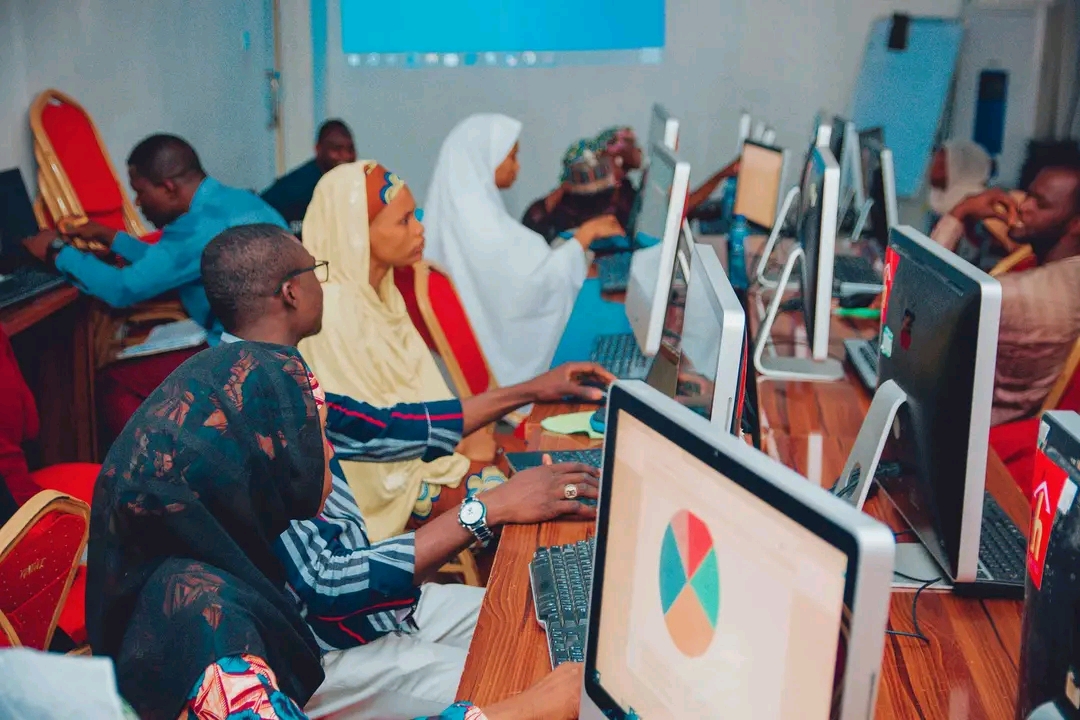When social media became abuzz with ad campaigns for the Three Million Technical Talent (3MTT) programme, Hassan Idris paid no heed to what he considered “noise” at first. It wasn’t long before the sociology graduate discovered the lifetime potential of a digital-training scheme that promised to create 2 million digital jobs by 2025, according to the federal government.
Shortly after President Tinubu’s assumption of office, the Nigerian Federal Ministry of Communications, Innovation and Digital Economy initiated a scheme to train 3 million citizens in digital skills and make Nigeria a sought-after talent source for countries in the West.
Of 100 Nigerian corps members polled in 2023, only 19 possessed any digital skills, even though most of them were active on social media. According to the pollster, this lack of digital skills represented a major reason for unemployment among many of Nigeria’s increasing graduates.
In the summer of 2023, the 3MTT programme emerged as a lasting solution to the dearth of technical skills as well as to empower graduates with high-demand digital skills such as software development, UI/UX design, data analysis and visualisation, among others.
The first phase of the programme operates in partnership with the National Information Technology Development Agency (NITDA), akin to a fellowship. Applicants with an interest in certain tech skills are welcome to apply, as the government covers the cost of their training with authorised instructors. Partners in the programme also assist graduates to secure employment.
The application process involves a five-step guideline, where applicants submit their bio-data, highlight their background skills, select a skill of their choice, and confirm all details before submitting their application. Applicants receive a confirmation of their application via email, where they are also notified about the selection process.
After he read about this ambitious initiative in November 2023, Hassan signed up for a course in product management. He hoped that this would add to his academic background in the social sciences. His initial interest in research and artificial intelligence redirected him towards data analysis and visualisation. He saw this path of analysis as not only simplifying future research but also as a door to myriad opportunities outside of his sociology degree.
“I have enjoyed the data analysis and visualisation course,” Hassan enthused, praising the clear and concise approach of the course’s modules.
Diverse motivations
Unlike Hassan, Saleem Shehu Abdullahi’s motivation was different. Initially drawn to the possibility of receiving a laptop through the programme, Saleem enrolled in a software development course in December 2023 but eventually backed out.
“It just wasn’t a good fit for me. I didn’t see any future in it,” said Saleem, a civil engineering undergraduate at Abubakar Tafawa Balewa University Bauchi (ATBU). Since then, Saleem hasn’t returned to complete the course modules.
Salma Muhammed, a 32-year-old mother of two who manages a small bakery in Kaduna, initially viewed the programme with scepticism. This changed after she consulted a social-media influencer and digital marketing expert, who highlighted the programme’s potential and remote learning options. 3MTT offers a hybrid model of online and in-person training, typically completed in about three months.
Salma, with a background in accounting, opted for a course in quality assurance by December 2023. As she explained to Prime Progress, the foundational modules she completed from the course have helped her to improve the quality of her bakery’s products.
“I find the curriculum interesting. I’m already seeing a little positive result for my bakery’s online sales,” Salma said.
Godwin Musa, a biochemistry student, initially found the programme appealing owing to the potential for career advancement. After he enrolled in UI/UX design in December 2023, Godwin discovered that the curriculum didn’t suit his learning preferences. He soon abandoned the course to explore other career options elsewhere.
“I’m sorry to say that the programme isn’t well-structured,” Godwin shared.
Challenges
While Hassan and Salma appreciated the lessons, they felt the time allotted to complete the foundational courses was insufficient. These courses started late and had a lot of information, making it hard to keep up, as Salma recalled. Hassan also mentioned not receiving the data bonus that some other fellows reportedly received.
“Inadequate time and lack of enough data bundles were a challenge for me. I don’t really have any idea why I didn’t get the data like others, even after doing all the necessary things required. I think 3MTT knows better,” Hassan told Prime Progress.
Notwithstanding, Hassan remains optimistic. He hopes the programme equips him with the skills needed to land a job at a top organisation or even secure a scholarship abroad for his postgraduate studies. Salma, on the other hand, looks forward to using her newfound skills to promote visibility for her bakery online while expanding her customer base.
Looking ahead
Some experts are sceptical about the success of the 3MTT scheme, even though the programme is still in its infancy stage. Some others believe in its potential to be a game-changer for Nigeria’s tech industry. For this to happen, three things need to be put in place, according to tech whiz Dominic Uche. First, the government needs to keep funding flowing. Second, companies need to team up with the programme to help graduates find jobs. And finally, the programme itself needs to stay flexible and adapt to the ever-changing tech world.
Even as the 3MTT’s goal of training 3 million Nigerians over the next four years and creating 2 million digital jobs by 2025 remains to be seen, its current trajectory hints at a promising future for Nigeria’s tech generation.
Hassan Idris initially dismissed the hype around the Three Million Technical Talent (3MTT) programme but later realized its value. Launched by the Nigerian government in 2023, the program aims to equip 3 million citizens with digital skills by 2025, addressing the high unemployment rate among graduates who lack these skills. Partnering with the National Information Technology Development Agency (NITDA), the program offers training in high-demand areas like software development, UI/UX design, and data analysis. The application process involves a detailed five-step guideline.
Hassan enrolled in a data analysis and visualization course, finding it beneficial. Others like Saleem Shehu Abdullahi and Godwin Musa had different experiences, with Saleem dropping out of a software development course due to a lack of interest and Godwin leaving UI/UX design because it didn't meet his learning preferences. Salma Muhammed, initially skeptical, found the program useful for her bakery business after consulting a digital marketing expert.
Despite its potential, the program faces challenges, including inadequate time to complete courses and inconsistent access to data bonuses. Experts believe the program can succeed if it maintains government funding, partners with companies to secure jobs for graduates, and adapts to the evolving tech landscape. The 3MTT program aims to create 2 million digital jobs by 2025, signaling a promising future for Nigeria's tech sector.






